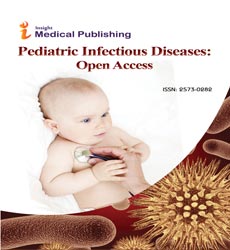Impact of Immediate Postnatal Microbial Colonization on Early Onset MildAnd Moderate Morbidities in Term Neonates
Rita P. Verma
Nassau University Medical Center, USA
Published Date: 2022-09-30Visit for more related articles at Pediatric Infectious Diseases: Open Access
Abstract
Objective: In this study the immediate postnatal rectal (RC) and nasopharyngeal colonization (NPC), and their implications in the early onset morbidities in term infants were investigated. Study design: In a retrospective cohort single center study, nasopharyngeal (NPCx) and rectal (RCx) microbial cultures were obtained within 20 minutes of birth in mild to moderately sick term infants. The clinical implications of the colonization in neonatal clinical course and outcomes were analyzed via multivariate logistic regression analyses. Results: A total of154 term infants were admitted for respiratory distress, hypoglycemia, maternalchorioamnionitis (CHO) and suspected neonatal sepsis, out of which 80(52%) were NPCx-positive. The duration of rupture of membrane (ROM) was higher (15.5+10 vs. 11.3 +11 hours, p=0.02) while the respiratory support requirement (15% vs. 35.1%, p =0.01) and occurrence of maternal GBS colonization lower (16.3% vs. 29.7%, p=0.04) in NPCx-positive infants. ROM increased (OR1.04, 95% CI 1.01-1.07), and maternal GBS colonization decreased the likelihood of having positive NP cultures (OR 0.31, 95% CI 0.14-0.72). The major microorganisms isolated were Staphylococcus epidermidis (41%), alpha hemolytic Streptococcus (16%), Escherichia coli (13%), and non-anthrax bacillus (7.5%). Among the enrolled infants, 44 (21.4%) were RCx-positive. The need for (11.4% vs.27.3%, p=0.03) and days on respiratory support (0.2+0.6 vs. 0.8+2.5, p=0.03) were lower and the occurrence of CHO higher (41% vs. 23.2%, p=0.04) in the RCx-positive infants. Cesarean section (CS) was performed less frequently (18.2% vs. 55.5%, p=0.001) and decreased the odds of having positive rectal cultures (OR 0.21, 95% CI 0.96- 5.37). Eighty percent of the RCx+ infants isolated E coli, and 6.8% Klebsiella. Conclusion: Early postnatal NP and rectal colonization decrease the occurrence and severity of respiratory morbidities but not independent of con-current clinical conditions in term neonates suffering from mild to moderate morbidities. NPC is supported by ROM and declines by maternal GBS colonization, while CS decreases RC.
Select your language of interest to view the total content in your interested language
Open Access Journals
- Aquaculture & Veterinary Science
- Chemistry & Chemical Sciences
- Clinical Sciences
- Engineering
- General Science
- Genetics & Molecular Biology
- Health Care & Nursing
- Immunology & Microbiology
- Materials Science
- Mathematics & Physics
- Medical Sciences
- Neurology & Psychiatry
- Oncology & Cancer Science
- Pharmaceutical Sciences
